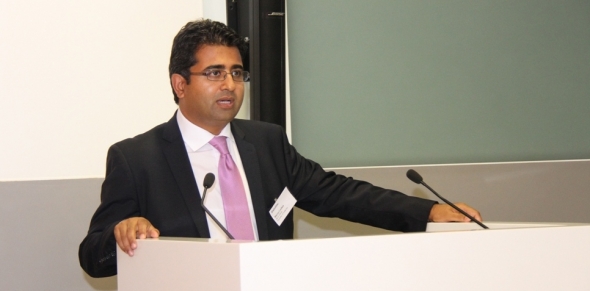Here is my publisher’s note in the latest issue of the India Investment Journal. Is the UK gearing up? The new India under Narendra Modi presents both an economic opportunity and a strategic responsibility for the UK. The UK’s 1 million strong Indian diaspora can play a pivotal role, should it so choose to.
Modi Means Business. Britain must mean Business too.
The result of the Indian General Elections 2014 have marked a distinctive turning point in India’s quest from developing to developed nation. The very decisive vote in favour of the Narendra Modi led government was, as much as anything else, a vote in favour of getting India back to business.
Business not just within the country to get the economy back on track but also with some of India’s closest global allies. The UK has historically featured high on that list but in the last few years the message has got lost somewhere.
David Cameron was categorical in the message he wanted to send out by not only leading the largest business delegation to India soon after taking over as British Prime Minister in 2010 but then following up it up with two further unprecedented visits. However, there was a conspicuous lack of a reciprocal gesture from the Congress led UPA Government. Was this out of some misplaced confidence by
the previous Indian government, one wonders?
Despite the imbalance in the overtures, Cameron’s enthusiastic invite to Narendra Modi to Downing Street on the day of the election results last month is a welcome sign, which one would hope pushes the India-UK relationship back into the priority zone where it belongs. For instance, Britain must be at the heart of any Global Investors Summit that the Modi government may be planning. Overtures from New Delhi seem to indicate a smooth transition to a much more trade focussed foreign policy. Challenges, however, remain, not least in the form of getting the Indian diplomatic service fit for purpose. Narendra Modi in fact, during the run up to the elections, made reference to the need for an expanded diplomatic service which is much more trade and investment focus. Could, or indeed should, Britain’s UKTI be a model worth considering? Sushma Swaraj, the new Indian Minister for External Affairs has her work cut out.
The recent trade figures look promising indeed, with two-way trade of goods and services between the UK and India registering a 6.6 per cent jump in 2013 to £16.4 billion, compared to £15.4 billion in 2012. The staggering depreciation in the rupee under the previous Indian government may have had something to do with this. We may still however just about be on course to hit the UK’s oft repeated goal of doubling UK-India trade by 2015 but the key now will be to think beyond these much-touted statistics.In Nirmala Sitharaman, Narendra Modi has chosen a hugely impressive, no-nonsense commerce minister. The omens are good. It is about time to focus on the depth of the relationship and go beyond the perfunctory label of “special”, which doesn’t really encompass the rich history and true global potential of the bilateral relationship.
A common frontier to explore would be partnerships in Africa. Why limit the deep relationship to respective borders? China¹s expansionism into Africa by many accounts has been worrisome, with little regard for environment or genuine social development for local Africans. Not a sustainable long term approach – which contrasts with the broad culture that UK and Indian companies approach overseas investments.
Some of the major sectors that should be on top of the UK-India agenda include infrastructure, energy and education. With ministers such as the enthusiastic Nitin Gadkari,who has a fabled track record on road building initiatives; Piyush Goyal, the very capable and affable Power Minister; and screen star turned political star, Smriti Irani leading the charge on reforming India’s mainly archaic education system, Narendra Modi has chosen well.
The long overdue conclusion of a tie-up over the ambitious Mumbai-Bangalore economic corridor should one would hope also get a much-needed boost. But here again, countries like Japan often have the edge over what Indians regard as an “overly tentative” UK. The UK High Commissioner to India, James Bevan, will play a crucial role in the negotiations, as will he no doubt in helping UK plc secure major defence and aerospace contracts.
There is an undeniable common ground between the UK and India on certain focus points such as job creation, business, innovation and skills. The current chair of the increasingly pivotal UK India Business Council, the Rt Hon Patricia Hewitt, prophetically declared as Trade & Industry Secretary over a decade ago “a job to India, is not a job lost in the UK”. This is the true mantra of co-operaton. The Indian Diaspora must also continue to act as crucial bridge builders and enablers to help capitalise on the common ground to ensure this new dawn for India can spread its rays across borders to one of its oldest and strongest allies – the UK.
For all the criticisms of David Cameron’s India policy, he has effected a master stroke in appointing a special envoy for engagement with the Indian Diaspora. His choice of the shrewd and determined Priti Patel MP
will it is hoped serve UK-India interests well.
Modi certainly means business. Britain must mean business too. The time to gear up has come.
 Manoj Ladwa is the Chief Executive of India Inc.
Manoj Ladwa is the Chief Executive of India Inc.
![]() The above article was published in India Inc’s print edition of the India Investment Journal launched in June 2014 in conjunction with the India Inc Seminar: A new dawn for India – What does it mean for UK-India Business?
The above article was published in India Inc’s print edition of the India Investment Journal launched in June 2014 in conjunction with the India Inc Seminar: A new dawn for India – What does it mean for UK-India Business?







